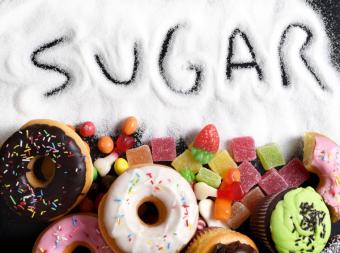Wednesday Wellness Word
If You Have High Cholesterol, The Culprit May Be Sugar
Cholesterol seems to start creeping up in our 30s or 40s as careers, kids and other obligations leave us more stressed, less physically active and heavier than ever. That's a problem because high cholesterol can increase your risk of heart disease and stroke. Lowering it without medication can be difficult, depending on your age and other health problems. For those with genetically high cholesterol, it can be nearly impossible without taking a statin, a prescription cholesterol-lowering medication. But for many of us, lifestyle changes are enough to bring cholesterol down.
Tips For Lowering Cholesterol
- Lose weight: Losing just 5 to 10 pounds can lower triglycerides.
- Don't smoke: Improves HDL cholesterol.
- Cut back calories: Extra calories not burned off with physical activity are converted to triglycerides and stored as fat.
- Limit sugary, refined foods: Eating lots of foods made with sugar and white flour can increase triglycerides. Limit these added sweets to 25 grams per day for women, 36 grams per day for men. One teaspoon of regular sugar or honey equals 4 grams.
- Limit fruit juice: Even 100 percent natural fruit juice is high in sugar. According to registered dietitian Nadine Pazder, "It's like drinking liquid sugar and is one of the first things eliminated when trying to lower triglycerides." Even most pediatricians advise families to limit young children to 4 to 6 ounces of fruit juice a day, and up to 12 ounces for kids over age 6. It's much better to eat whole fruits.
- Choose healthy fats: These include olive, canola, peanut, sunflower and corn oils. Avoid trans fats or partially hydrogenated oils found in packaged cookies, crackers and snacks. Avoid solid fats.
- Limit alcohol: Drinking too much can elevate triglycerides and increase blood pressure. One alcoholic drink per day has been associated with higher HDL levels. But, if you don't drink, don't start. Avoid sugary mixers.
- Exercise: Get at least 30 minutes of physical activity about every day to lower triglycerides and increase HDL, or "good" cholesterol.
- Fish oil: Eat seafood high in omega-3 fatty acids regularly. Talk to your doctor about whether you need fish oil supplements to lower triglycerides.
- Add these to your diet: Avocados, almonds, walnuts, flax, whole grains, plant sterols and stanols found in fortified products, including margarine-like spreads, milk, yogurt, some cooking oils and salad dressings.
- Increase soluble fiber: Eat more oats and oat bran, fruits, beans and lentils to lower LDL cholesterol.
- Add whey protein: When given as a supplement, whey protein powder (found in grocery and health food stores) has been shown to lower LDL and total cholesterol.
Posted:
October 26, 2016


